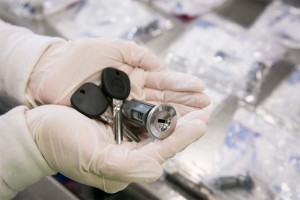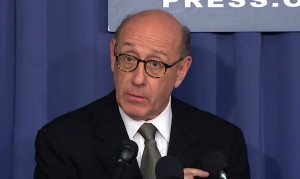General Motors may take a step closer to wrapping up one of the most troubling incidents in its long history, according to news reports, agreeing to settle a Justice Department criminal investigation into it botched handling of a deadly ignition switch defect.
If preliminary reports prove accurate, GM would pay a penalty in the “hundreds of millions of dollars,” and perhaps as much as $900 million, according to sources close to the investigation quoted by NBC News and other media outlets. That would be substantially less than the $1.2 billion paid by Toyota Motor Co. in March 2014 to settle an investigation into its own safety-related problems.
The GM settlement also is expected to include a wire fraud charge, though there are no indications any specific individuals will be subject to criminal prosecution, a possibility raised early in the Justice Dept. investigation – and by GM’s own move last year to fire 15 company employees due to their role in delaying a recall of 2.5 million vehicles equipped with faulty switches.
GM still faces a number of lawsuits related to the ignition switch issue, and investigations by various states attorneys general related to the defect. But settling with the Justice Dept. would go a long way towards putting the issue in the rearview mirror for GM – and for Mary Barra, the veteran company executive who became CEO only months before the automaker finally ordered the ignition switch recall.
After announcing that service action, Barra moved quickly, issuing a series of corporate mea culpas, appearing at several hearings on Capitol Hill, and setting up a victims’ compensation fund headed by Kenneth Feinberg, a lawyer who oversaw similar funds for victims of the 9/11 attack and the BP oil spill in the Gulf of Mexico.
Feinberg recently wrapped up his work after agreeing to settlements covering the deaths of 124 people, as while as 275 who were injured. A final figure has yet to be released, though the carmaker had set aside $625 million to cover the potential cost of the fund.
(Victims’ fund wraps up; rejected 91% of claims. Click Here for details.)
The problem stems from an ignition switch that was widely used in older General Motors products such as the Chevrolet Cobalt and Saturn Ion. It apparently failed to meet the automaker’s own specifications and was prone to inadvertently shutting the vehicle off, especially when the vehicle was jostled by potholes or when going over speedbumps and railroad tracks. When that happened, a driver could lose control and, if a crash occurred, the vehicle’s airbags would fail to operate.
After acknowledging the problem, GM was fined $35 million by the National Highway Traffic Safety Administration, one of the larger penalties the agency had levied up to that time. Under Barra’s orders, GM also appointed a new safety czar reporting directly to her. That quickly led to a flood of additional recalls for a wide range of other safety-related problems.
All told, the company recalled more than 30 million vehicles in 2014, a major reason why total U.S. auto recalls in 2014 topped 64 million, about twice the previous annual record. GM has continued to be more aggressive about safety issues this year – as has the rest of the industry – though the pace at the company has slowed a bit.
Both the U.S. Justice Department and NHTSA have been taking a more aggressive role in automotive safety of late. NHTSA has come under intense criticism for missing both the GM ignition switch problem and another major safety defect involving airbag inflators produced by Japanese suppliers. That has now led to the recall of nearly 30 million vehicles in the U.S. alone.
(Takata ignition switch problems could grow worse. Click Here to find out why.)
The agency’s new Administrator Mark Rosekind has promised a zero-tolerance policy, something underscored by the record penalties levied against Fiat Chrysler earlier this year.
As for Justice, it settled a separate investigation into Toyota’s handling of problems related to so-called Unintended Acceleration 18 months ago with a fine of $1.2 billion. Though the company also agreed to ramp up its safety efforts, and have its actions monitored, no individuals were charged.
Similar steps appear to be in store for GM, and that concerns Clarence Ditlow, a long-time industry critic and head of the non-profit Center for Automotive Safety in Washington.
“GM killed over a 100 people by knowingly putting a defective ignition switch into over 1 million vehicles,” said Ditlow, who expects no current or former GM employees to be charged. “Today thanks to its lobbyists, GM officials walk off scot-free while its customers are 6 feet under.”
(US highway deaths heading for 8-year high, warns NHTSA. Click Here for more.)




This decision tends to substantiates my belief that Toyota was excessively fined based on the false claims of unintended acceleration that never existed. It’s worth noting that I do not care one bit about Toyota, I have never owned a Toyota nor do I ever plan to own a Toyota. I care about the inconsistent actions of federal agencies in dealing with defects and other judicial failings. We have a broken judicial system in America, that’s for sure.
That was a frightening defect … every dollar of this payout will be fully justified!
It looks like maybe ~150 deaths could have possibly been related to the defect. No word on how many cars actually suffered the problem but the percentage is likely very low considering the many millions of cars with this ignition switch.